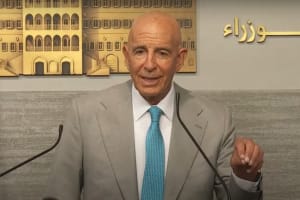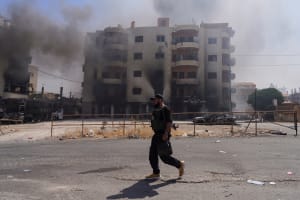Washington facilitates first meeting between Israeli and Syrian ministers in 25 years

U.S. Ambassador to Turkey Thomas Barrack announced on Thursday that the United States had facilitated the first meeting between Israeli and Syrian ministers in a quarter of a century. Israeli Strategic Affairs Minister Ron Dermer, a close ally of Prime Minister Benjamin Netanyahu, reportedly met with Syrian Foreign Minister Asaad al-Shaibani in Paris, France.
“I met this evening with the Syrians and Israelis in Paris. Our goal was dialogue and de-escalation, and we accomplished precisely that. All parties reiterated their commitment to continuing these efforts,” Barrack wrote on 𝕏.
The last time a high-level meeting was held between Israel and Syria was in 2000 when former U.S. President Bill Clinton facilitated a meeting between former Israeli Prime Minister Ehud Barak and former Syrian Foreign Minister Farouq al-Sharaa.
Israel and Syria officially neither confirmed nor denied the meeting between Dermer and al-Shaibani in the French capital.
The reported high-level meeting of the ministers comes after the U.S. announced earlier this month that both Syria and Israel had agreed to a ceasefire after Syrian regime forces and Islamist Bedouin allies attacked the Druze community in the southern Sweida region of Syria. Hundreds of Druze civilians were massacred in the clashes. Israel, which has close ties with the Druze community, vowed to protect them and responded by striking Syrian regime forces.
Barrack, who also serves as the U.S. envoy to Syria, at the time urged Syria’s diverse population to unite and build a peaceful future Syria.
“We call upon Druze, Bedouins, and Sunnis to put down their weapons and together with other minorities build a new and united Syrian identity,” the U.S. envoy stated. However, this vision has been undermined by significant rivalries between various tribal groups in the war-torn country.
While the Syrian regime formally agreed to a ceasefire, its Bedouin allies argued that the ceasefire did not apply to them and vowed to continue attacking the Druze minority population.
The U.S. ambassador to Turkey criticized the Israeli strikes on Syrian regime forces and assets.
“The U.S. was not asked, nor did they participate in that decision, nor was it the U.S.’s responsibility in matters that Israel feels is for its own self-defense,” Barrack stated. He added that Israeli intervention in Syria “creates another very confusing chapter,” and noted that the Israeli strikes “came at a very bad time.”
Instead of condemning the massacres of Druze civilians, the U.S. envoy asserted that the “killing, the revenge, the massacres on both sides” had taken place.
“The current government of Syria, in my opinion, has conducted themselves as best they can as a nascent government with very few resources to address the multiplicity of issues that arise in trying to bring a diverse society together,” he added.
Before the Syrian and Bedouin attacks on the Druze community in Syria, Israel and Syria held several de-escalation talks to prevent hostilities between the two countries. Some pundits believed that Syria, a country that has been at war with Israel since 1948, could potentially join the Abraham Accords and normalize relations with the Jewish state. The recent tensions in Syria have likely pushed potential normalization into a more distant future.
Meanwhile, Washington seeks to reduce tensions between Turkey and Israel, two militarily powerful countries and U.S. allies, both with security interests in Syria.

The All Israel News Staff is a team of journalists in Israel.
You might also like to read this:
















